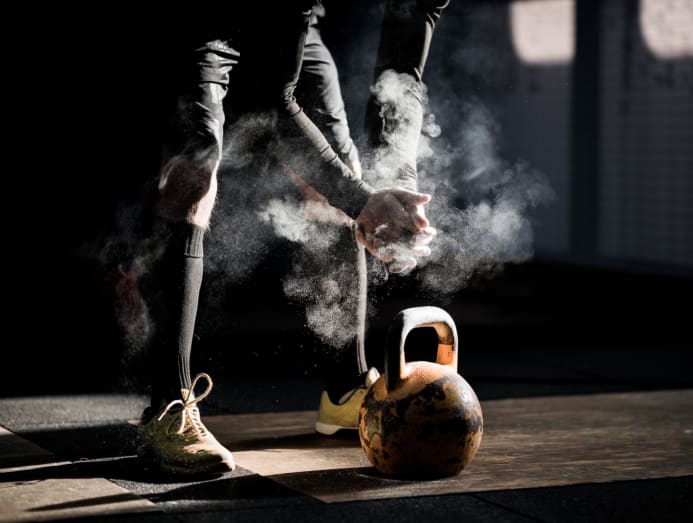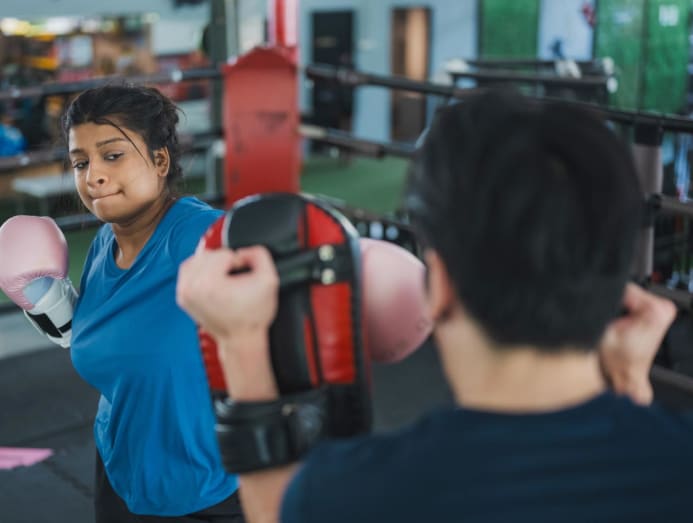Why do some people swear while working out? Does it actually help you perform better at the gym?
A 2024 mini review on previous studies noted that getting foul-mouthed could “improve physical performance during short and intense tasks requiring strength and power development”. How can you reap the benefits without offending fellow gym-goers?

(Photo: iStock/Edwin Tan)

This audio is generated by an AI tool.
I’ve recently started going to a gym where everyone is exceedingly polite. On any given day, the most explicit sounds are grunts and huffs, if at all. But in other gyms I've been to, swearing could be as commonplace as sweating.
Nothing polarises people, gym-goer or not, as much as cussing does. But why? For instance, what makes the word “f***” intrinsically offensive and “puck” okay – even though they sound similar?
For one, swear words are taboo words that are “usually judged as shocking”. “The swearer may be considered antisocial and offensive”, wrote Associate Professor Nicholas Washmuth from Samford University’s Department of Physical Therapy in a 2022 paper he co-authored.
And in most cultures, there are three areas that are often contentious: Religion; sex and sexual body parts; and bodily excretions, according to Dr Karyn Stapleton, a senior lecturer from Ulster University’s School of Communication and Media, in her paper. Which explains why “damn”, “hell”, "piss”, “ass”, “shit”, "p****" and "f***" are often regarded as swear words.

Then, there are those who regard swearing as a passionate way of communication – and even a sign of intelligence. "People that are good at language are good at generating a swearing vocabulary," said Timothy Jay, a professor emeritus of psychology at the Massachusetts College of Liberal Arts on CNN.
And for that matter, more honest as well. “When you’re expressing your emotions with powerful words, then you’re going to come across as more honest," he added.
WHY DO PEOPLE SWEAR IN SPORTS?
Why indeed since “swearing can negatively impact how the swearer is perceived by others, which may lead to social isolation and depression”, according to Assoc Prof Washmuth?
As the over-50 per cent of the population who swears “sometimes” or “often” in his study probably already knows, swearing can also have its benefits. “Like drugs, words have an ability to change the way a person thinks, feels and performs,” he wrote.
In a separate 2024 mini review on previous studies that look into swearing’s effects, Assoc Prof Washmuth concluded that swearing “has been shown to improve physical performance during short and intense tasks requiring strength and power development”. In a 2022 experiment, participants doing chair push-ups were able to hold the position for 10 per cent longer when swearing, compared to repeating a neutral word.

In a 2023 study, where a swear word of the participants' choice (the majority chose "f***") was repeated every 5 seconds during each task, it was found that grip strength went up by 9 per cent, push-ups to fatigue extended by 15 per cent, planking to exhaustion by 12 per cent, and wall-sit time to exhaustion by 22 per cent.
“Delving deeper, researchers believe that it is not because of any mystical property of the four-lettered word but because swearing reliably induces a state of heightened physiological and psychological arousal as well as reducing inhibition,” said Assistant Professor Audrey Lim from SIT’s Health and Social Sciences Cluster.
The “physiological arousal” could be the result of activating the sympathetic nervous system responsible for the fight-or-flight response during stressful or dangerous situations, she said.
Also, “the taboo nature of profanity can heighten emotions, producing a mini jolt of excitement, anger, aggression or bravado, which might trigger pain-inhibitory circuits, reducing the discomfort of effort or limitations by pain”, said Asst Prof Lim. “This naturally enables one to apply more force or persevere slightly longer than we otherwise could under a calmer state.”
It’s probably why athletes such as Serena Williams and NBA players sound as explicit as rappers on the court – although in some cases, swearing doesn’t help with the exercise itself but as an expression of relief or victory, said Yan Lin, Bespoke Fitness’s FitRX head coach.

“Swearing can also create a mental shift, helping people focus and feel more determined. In some ways, it works like the grunting sounds tennis players make to increase their power,” said Alla Demutska, the clinical director of psychotherapy and counselling at The School of Positive Psychology.
“When we swear, the brain's emotional centre, the amygdala, becomes more active. This could help people push through discomfort and give extra effort,” said Dr Demutska. “While we don’t fully understand all the ways this works, it’s likely a mix of physical, emotional, and mental effects coming together to give that extra push.”
HOW DO YOU TAP INTO THE BOOST FROM SWEARING?
First, the timing appears to play a role, much like vocal expressions of exertion like grunting or huffing, said Dr Demutska. Research suggests that swearing just before or during an exertion may improve strength and endurance, she said.
“Experiments have shown that participants who swore at specific intervals – such as every few seconds or at a steady pace – demonstrated improved performance, regardless of the exact frequency or volume,” said Dr Demutska.
Second, the language you cuss in also plays a part. “Swearing is probably most powerful when done in your mother tongue. The connection is the most primal,” said Tiat Lim, a FitRX coach with Bespoke Fitness.
Dr Demutska agreed: “Research suggests that swearing tends to have a stronger impact when it’s in a person’s first language or a language with deep emotional ties as these words often carry more intensity and personal meaning. The choice of swear words may matter because our emotional connection to language influences how we react to certain words”.

But don’t take this as a sign to let fly your swear words; you don’t want to disrupt or offend others. “Cultural norms and social acceptability also play a role,” said Dr Demutska. “Some words may carry more stigma or be less appropriate in certain environments.”
WHAT IF YOU CAN’T SWEAR IN PUBLIC?
You can still psyche yourself up or produce comparable effects as swearing through shouting, grunting or yelling, suggested Asst Prof Lim.
“The common thread is that heightened emotional intensity – whether induced by a swear word, a shout, an inspiring song or a slap on the back – tends to transiently increase one’s ability to generate force,” she said. “Replacing swear words with non-offensive but intense words or sounds that have strong emotional connections to the individual might still provide a similar effect.”
Or do as Lim does and swear when you need to, such as “for maximal effort to get you over the hump”. “For example, when pushing your final-to-failure rep,” he said. “We are a gym, not a library. If it helps to squeeze out better performance, hell yeah!”

And while it may not be as effective (the scientific jury is still out on this), try swearing internally, suggested Asst Prof Lim. Saying it in your head or quietly to yourself may possibly enhance performance, she said. Dr Demutska also seconded the silent swearing alternative. “Mentally repeating a swear word may still activate the brain’s emotional and pain-processing centres without disturbing others.”
If it’s a family-friendly gym, try using positive, emotionally charged phrases such as “let’s go!” or “jia you!” instead, said Dr Demutska. “However, research suggests that made-up swear words don’t have the same pain-reducing effects as real swear words.”
Of course, you can always use non-verbal vocal exertion techniques such as grunting, forceful exhalation or controlled yelling. There are studies linking grunting to increased force output in sports like tennis and shouting to enhanced grip strength, said Dr Demutska.
“Until further research explores silent swearing, gym-goers may want to experiment with breath control, grunting or mental swearing to tap into its potential benefits – without risking side-eye from fellow lifters,” she suggested.





